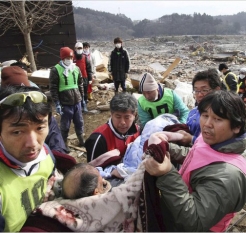By Rosaleen Cunningham
 The massive earthquake and subsequent tsunami that struck off the east coast of Japan on Friday 11 March was one of the largest ever recorded.
The massive earthquake and subsequent tsunami that struck off the east coast of Japan on Friday 11 March was one of the largest ever recorded.
The Japanese authorities are reporting that thousands of people have been killed by the quake and the tsunami that followed. Many thousands more are missing.
Older people heavily affected
Given that a quarter of the Japanese population is over 60, older people have been heavily affected.
The response is being led by the Japanese government which is amongst the best prepared in the world for such disasters. Japan has announced it is not seeking international humanitarian assistance.
Japanese Self Defence Forces (SDF), police, national rescue teams, Red Cross medical teams, as well as Disaster Medical Assistance Teams have all been involved since immediately after the tsunami struck.
Different support needed in developed countries
HelpAge International and its partners are therefore not launching an appeal or setting up an immediate humanitarian response.
HelpAge and its partners ordinarily respond to disasters in developing countries where the support needed after a disaster is quite different from a developed country.
In poorer countries, infrastructure is usually weak, governments often are struggling to meet overwhelming needs and many people are already extremely vulnerable, even before a disaster.
Older people should be included in the recovery effort
We do know, however, that Japan has a very high proportion of older people (23% of the population are over 65). Initial reports already suggest that many of those who died are likely to be older people – which could prove one of the defining characteristics of this disaster.
HelpAge has worked over the last few years to ensure that older people are included in all humanitarian responses. We hope to share this expertise in the coming months with agencies working on the ground in Japan.
For example, our new shelter guidelines include practical suggestions on how to ensure older people are considered in emergency housing programmes. These have been developed in collaboration with the International Federation of the Red Cross.
For more information, you can read our CEO’s blog on the Japan earthquake and tsunami.
